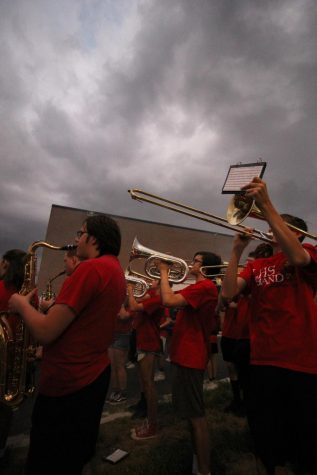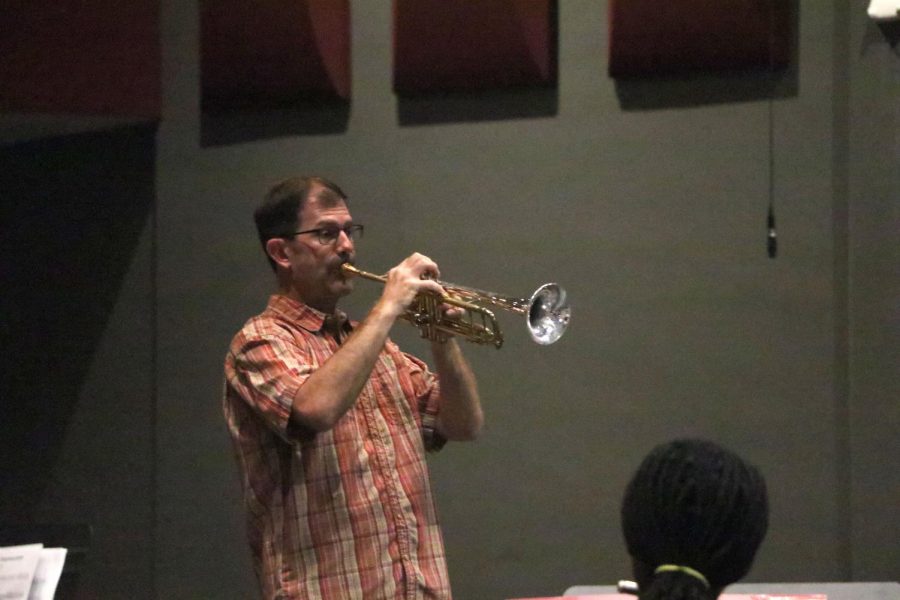The return of music performance
December 16, 2021
The unique mental health benefits of music classes came from the containment of the classes. In choir class, students put their phones in the back of the room so they can focus entirely on music for the class period. This sort of separation creates a place where students are not only allowed but forced to separate themselves from stressors to simply spend an hour making music. Online learning was not conducive to this atmosphere.
The second major benefit of music classes comes from their nature as co-curricular classes. Out-of-school events, practices and performances allow them to create social bonds similar to an athletics team. During COVID-19 lockdowns, these performances were abandoned altogether or heavily scaled back, gutting the constant social connection needed to form the deep bonds.
As these sorts of performance and social opportunities began to restart the past few months, the benefits were instantly felt by students.
Teachers noticed a new hunger and drive for performance from students after having a year without them.
“What used to be another thing to take up your time, or one more event to get through before winter break, has now become a chance to do something exciting and unique,” current LHS orchestra teacher Mariah Barnett said. “Something that we have missed for the last year and a half. A chance to perform together again and make music. Experience the feeling of putting in a lot of time and hard work for a great show. There is nothing like it.”
The ability to form and mold communities is a crucial tenet of social bonding and creating spaces that are helpful for student mental health.
“Each ensemble has their own personality, their own sense of belonging and their own classroom community,” Barnett said. “They get to build this space that is uniquely their own and when students figure that out it makes the class so much better. This has been so important for kids to have when being back in person after the pandemic. They need a space in the school that is theirs, that they feel safe and that they can be whomever they want to be.”
When I first started teaching I did not think that my job would be so closely tied to students’ well-being or their mental health.
— Mariah Barnett
For lots of teachers, their role includes a lot more than just educating. Especially those who teach classes with such a strong community focus like a music class. The relationship between teachers and students in those roles goes both ways.
“When I first started teaching I did not think that my job would be so closely tied to students’ well-being or their mental health,” Barnett said. “Probably a naive perspective to have, honestly. Many days I feel more like a parent or counselor than I do an orchestra teacher, but [I] wouldn’t change a thing about it. The enthusiasm, excitement and enjoyment that I see students receiving from making music and from being in orchestra is all I need. They make coming to school everyday, even in a pandemic, worthwhile and I am so grateful for all of my students.”
For Dirks, as a longtime music educator, cultivating these music safe spaces is a crucial role of teachers and faculty in the music department.
“Although we may feel unprepared to cope with specific mental health concerns,” she said, “we can provide activities that reduce stress and anxiety in our classrooms that are authentic to who we are individually and as a music community.”
While enrollment at Lawrence High School has stayed fairly constant during the COVID-19 pandemic, music classes at LHS have seen a staggering 50% drop in enrollment with ensembles having to heavily adapt their usual practices just to survive.

This lack of engagement creates the possibility for severe mental health concerns among the student body. Some students find engagement in other activities like athletics which can offer many similar benefits, but many of the unique benefits to music are lost, and most worryingly, students who have chosen to simply not engage in school activities as a whole could be at risk of isolation without the connection that music classes have offered in the past.
Encouraging engagement in music classes, especially for those without other comparable spaces, will be a crucial task for educators and administrators in the coming years.
Students that are heavily involved in music classes recommend getting involved for all of their peers, regardless of background.
“Everyone should try some type of musical activity in high school,” Thomas said. “Even if you start out with zero experience, our directors have so much to teach, and the environment is so friendly and encouraging. Musicians are the kindest and most successful students in school.”
For musicians, it has been an incredibly difficult year and a half. But as music ensembles begin to meet together and perform again, the dynamic power of music is being felt in the lives of students once more.
“The people who are here are loving rehearsing, they love doing it,” said Jones. They love being part of it and they’re happy to be back together and doing what we want, you know, which is making music together. So it feels like we’re back.”
